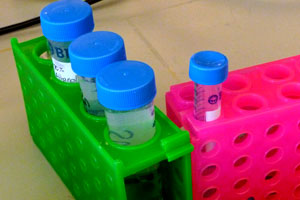You've probably heard about some of the breakthroughs in personal genome sequencing, where companies take a look at your DNA and send back your risk profile. That can be confusing information to have (check out this post from Quest blogger Dr. Barry Starr for his take on it). But there's a flip side to all this genetic research that doesn't have to do with risk: personalized medicine. That's where doctors can customize medical treatments to fit your genetic profile.
Right now, there are only a handful of drugs that are labeled with genetic information, so doctors can take it into consideration. (Here's an article from the New York Times that gives an overview). But that doesn't mean existing medications are left out. I spent some time with Deanna Kroetz in this story, who studies pharmacogenomics at UC San Francisco. She explained that differences in our DNA can cause some of us to process drugs at different rates. We all metabolize drugs with enzymes in the liver, but based on expression of our DNA, we may have different levels of enzymes or our enzymes may not function as well.
There are plenty of other things that affect how we process drugs, like our diet or other drugs we're taking. But these genetic differences mean some people metabolize drugs quickly and others metabolize them slowly. One example that many people are familiar with is codeine. Codeine is converted into morphine by our bodies and it's the morphine that actually has an effect -- but that conversion depends on a particular enzyme. Some people have very low levels of the enzyme that's needed, so codeine doesn't do much for them.
They're also studying another drug response mechanism at UCSF and it has to do with our cells. Many drugs have to go inside our cells in order to have an effect, but if you think back to high school biology, you might remember that cells are protected by membranes. It takes transporters - those special gatekeepers sitting on the cell membranes -- to allow things in. They also can spit things out of cells.

